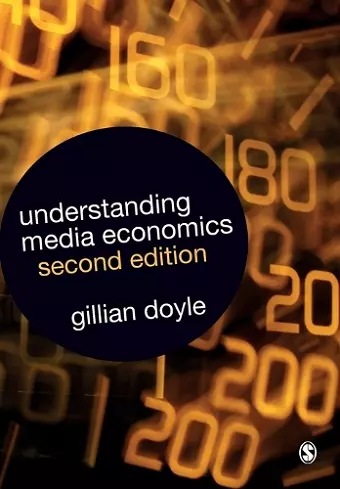Understanding Media Economics
Format:Paperback
Publisher:SAGE Publications Inc
Published:18th Apr '13
Should be back in stock very soon
This paperback is available in another edition too:
- Hardback£132.00(9781412930765)

This revised edition offers an insightful exploration of media economics, addressing contemporary challenges and themes such as innovation, market segmentation, and digital transformation, making it essential for students in related fields.
Understanding Media Economics is a comprehensive examination of the intricate relationship between economic principles and the media industry. This second edition has been thoroughly revised to address the rapidly changing landscape of digital media, moving beyond traditional sector-specific analyses. The book emphasizes the critical issues and dynamics that shape the media industries today, making it a valuable resource for students and professionals alike.
The author, Gillian Doyle, skillfully integrates economic theory with contemporary case studies, providing readers with insights into the structure of the media sector and the challenges it faces. Key themes explored in the book include innovation in digital platforms, the significance of networks, branding strategies, and the complexities of rights management. By addressing these pressing topics, Doyle offers a clear understanding of how economic forces influence media production, distribution, and consumption.
This book serves as an accessible introduction to media economics, making it suitable for courses in media management, media policy, and the creative industries. The insights provided are not only relevant for academic study but also for practitioners navigating the evolving media landscape. Overall, Understanding Media Economics is an essential text that demystifies the economics of media, making it engaging and easy to grasp for readers at all levels.
This is an excellent textbook on media economics, which takes into account the full complexity of the subject matter in the context of structural, technological and creative transformations that characterise digital media at the start of the twenty-first century.
Milan Todorovic
London Metropolitan University
Gillian Doyle′s book provides a wide-ranging, accessible introduction to media economics and their application to a broad range of media topics from advertising and business models to copyright, audience demand and public policy. Whilst critical of the certainties and simplifications of economists, Doyle delivers not only a lucid overview of economic concepts like merit goods, deficit financing and economies of scope, but shows how these continue to be relevant and useful for understanding how media work. The book is alert to the disruptive effects of technology, but highlights the continuities between old and new media, and between economic certainties and media complexity. Some of the chapters could work as self-contained extracts for a seminar or specialist module (each chapter helpfully includes a list of learning outcomes), but the book perhaps works better as a single narrative, with recurrent themes and motifs. What′s refreshing about the book is Doyle′s willingness to move beyond the boundaries of media economics and forge connections with a diversity of topics, policies, practices and debates. The book is generous with its expertise, covering the basics for a non-specialist and providing up to date insights from current research for more advanced readers, intercut with interviews and examples from the industry. Throughout the book Doyle′s experience as a teacher shines through, a reminder that the virtues of good teaching - clear structure, avoiding jargon, questioning received wisdom and providing the resources for readers to form their own opinions rather than expounding one′s own - can also inspire good research.
Chris Bilton
Centre for Cultural Policy Studies, University of Warwick
In this accessible and thoroughly up-to-date book, Gillian Doyle expertly synthesizes economic theory and contemporary cases to both explain the structure of the contemporary media industry and shed insight on the significant challenges and controversies confronting the sector. A hugely valuable resource.
Lucy Küng
Reuters Institute for the Study of Journalism, Oxford University, and Jonkoping University, Sweden
This second edition of Understanding Media Economics is a welcome overhaul that gets to the heart of the issues and challenges in today’s media industry. It is more applicable beyond the classroom than the previous version and should be on the reading lists, not just of students in media economics course, but also of many in Westminster, Brussels and Strasbourg. -- Sally Broughton Micova
ISBN: 9781412930772
Dimensions: unknown
Weight: 420g
232 pages
2nd Revised edition